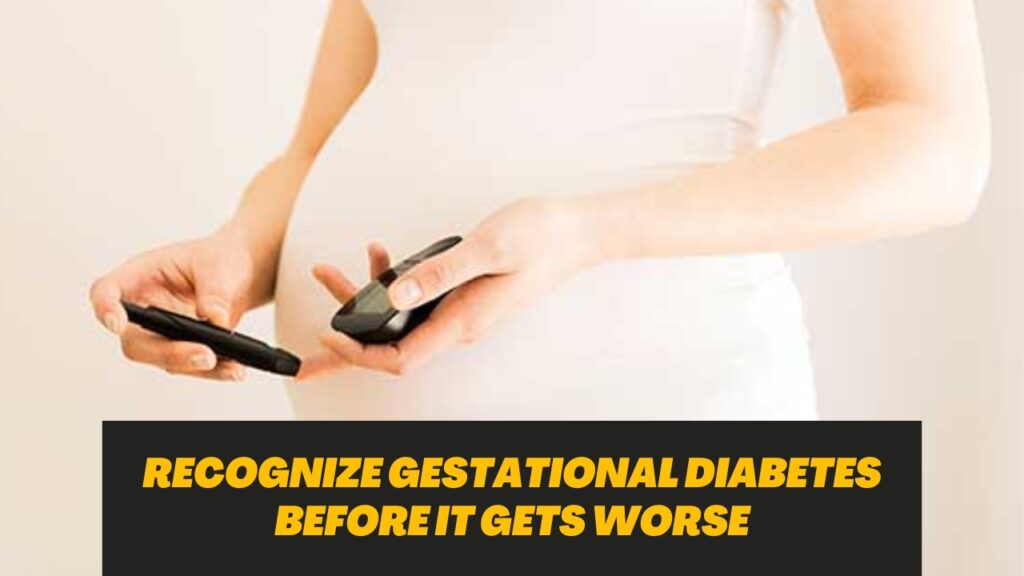Don’t keep thinking anymore about what is gestational diabetes, as you just have to read this article to know all about this. High blood glucose levels are the hallmark of gestational diabetes, which occurs throughout pregnancy. After the baby is born, the symptoms typically disappear.
- Gestational diabetes can happen at any time during pregnancy, but it happens most often in the second and third trimesters.
- It happens when your body doesn’t make enough insulin, a hormone that controls how much sugar is in your blood, to keep up with the needs of pregnancy.
- If diabetes is found during pregnancy, it may make it more likely that problems will happen during pregnancy and after the baby is born.
The gestational diabetes symptoms can be mitigated via prompt diagnosis and treatment. Gestational diabetes treatment is not impossible, but it is preferred that you identify it in the early stages.
Symptoms Of Gestational Diabetes That Are Important For You To Notice
In order to get treated immediately, it is mandatory to identify the signs of gestational diabetes in the early stages. Some of the signs of gestational diabetes are discussed below. If you’re experiencing any of these, it’s quite likely that you have gestational diabetes.
What causes gestational diabetes are metabolic disorders. Your chances of getting diabetes rank high with the disorders in metabolism. Caused by the body’s inability to maintain an appropriate quantity of glucose in the blood, this condition has serious consequences. Everything we eat, from macronutrients like protein and fat to micronutrients like vitamins and minerals, is broken down into glucose in the end. All of the systems in our bodies get the fuel they need to work well from glucose. Cells cannot take up glucose from the blood and use it for energy without insulin. One of the many things the pancreas does is make the hormone insulin.
Gestational diabetes can lead to a lot of serious health problems, such as high blood pressure, heart disease, nerve damage and neuropathy (pain in the nerves), kidney disease, and stroke. Eventually, gestational diabetes can ruin your health.
Patients Of Gestational Diabetes Go To The Bathroom More Often
One of the first and most obvious signs of diabetes is going to the bathroom more often. Four to seven restroom visits per day are the norm for the average individual. A common warning sign is going to the bathroom more often than usual or getting up in the middle of the night to urinate, even if you just went.
This is because when there is too much sugar in the blood, the kidneys get a message to work harder. They then get rid of the extra sugar through urine so it doesn’t hurt the body. Extra sugar in the urine can attract water, so it’s not surprising that this makes you have to go to the bathroom more often.
Women Feel Constantly Hungry In Gestational Diabetes
Feeling constantly hungry is a common complaint among those who have diabetes or are at high risk for developing the disease. You are always tempted by both healthy and unhealthy foods. Your brain will keep telling you to eat, even if your stomach is already full.
This is because people with diabetes can’t control how much sugar is in their blood on their own, so their blood sugar levels change a lot. If they drop too quickly, the brain will think this means there isn’t enough glucose and send signals to the hunger center. Because of these messages, people feel hungry. In order to get back to a healthy state, your doctor would prescribe you a gestational diabetes diet.

Gestational Diabetes Causes Severe Dehydration
Gestational diabetes makes this symptom more obvious because people with the disease need to drink a lot of fluids all day and night. If you are at risk of getting diabetes, you should drink at least 1 gallon (almost 4 liters) of water every day. Another thing that might make you want to drink more water is that you won’t feel instantly refreshed and hydrated after drinking a glass of water or an energy drink. There is a direct link between how much fluid you drink and how much you pee.
When a lot of fluids and electrolytes are lost through urination, the kidneys send a signal to the thirst center in the brain. Increase your water intake according to your frequency of restroom breaks.
Unusual Fatigue Is Experienced During Gestational Diabetes
If the body can’t control high blood sugar levels, it can make a person feel tired and slow. Because your muscles aren’t getting the fuel they need, you might feel very weak or tired and be unable to do your normal activities.
Because you have a high level of insulin resistance, glucose can’t get into your cells. This means that your muscles don’t get the fuel they normally need to do daily tasks. Your body is breaking down the proteins in your muscles so that it can use them as a source of energy. You’ll be perpetually exhausted if you couple any of them with a lack of sleep.
Rapid Weight Loss Occurs In Gestational Diabetes
Another clear and early sign of gestational diabetes is a loss of body weight in a few weeks to a few months which can’t be explained. It’s more common for women with gestational diabetes to experience a loss of body mass. This is because women with gestational diabetes can have their ability to use sugar stop working all of a sudden.
When the amount of glucose (energy) in the blood drops, the body thinks it is starving and breaks down muscle proteins to give the cells new fuel. This happens because glucose is the body’s main fuel source. The bad things about this process are that it causes muscle loss and quick weight loss.
Symptoms Often Include Tingling Or Numbness In The Hands, Feet, Or Face
Feeling weary all the time is the result of a combination of not getting enough sleep and several other factors. A numb hand, foot, or another limb may be the first thing you notice when you wake up in the morning. The severity of your pain or burning sensation may increase as your disease progresses. The nerves and nerve endings in the hands and feet suffer damage when blood sugar levels are too high. The main cause of slow nerve repair is less blood flow to the extremities, which is caused by narrowed blood vessels and being far from the heart. This decreases the likelihood that nerves will receive oxygen and nutrients. Both diseases can make your limbs feel tingly and numb.
Symptoms Such As Redness, Irritation, Or Dryness Of The Skin
Several causes, including insulin resistance and high blood sugar levels, contribute to the chronic itching and irritation experienced by diabetic patients. Acanthosis nigricans, which occurs when the disorder has advanced, causes darkening of the skin in the creases of the neck and under the arms.
Possible causes include poor blood flow to the skin and excessive urine output from the kidneys. A possible link between insulin resistance and skin darkening has been found.
Wounds Don’t Heal Of A Gestational Diabetes Patient
Slow wound healing is one of the most irritating complications of gestational diabetes. People with diabetes may have delayed recovery from even mild accidents. Distance from the heart and poor blood flow means that extremities are particularly vulnerable to a slowed healing process.
A high blood sugar level causes blood vessel damage and constriction, which worsens blood flow. Because less blood is reaching the wounded skin, the healing process is hindered.
Women With Gestational Diabetes Get Several Eye Conditions
High blood sugar levels can cause vision problems by damaging the retina and other sensitive blood vessel tissues that supply the eyes. Another common symptom of diabetes is the sudden emergence of “floaters” in front of the patient’s eyes.
This is due to the fact that blurred vision is ultimately caused by damage to the blood vessels in the eyes. Additionally, edema and impaired focus can result from the lens losing fluid due to high blood sugar.
Gestational Diabetes Cause Yeast Infections In The Body Of Women
Women are prone to developing yeast infections. Yeast thrives in warm, damp environments, such as those found under the breasts, in the axilla, and in the genital area. Yeast thrives in the high glucose environments encountered in diabetic patients because it uses glucose in the same way that people do.
Women Suffering From Gestational Diabetes May Get Utis
Women with gestational diabetes are more likely to get urinary tract infections. Because of diabetes, bacteria that cause infections were able to get into the urinary tract and take up residence there. This led to fever, painful and burning urination, and in rare cases, bloody urine. Recurrent and chronic UTIs in women are caused by things like poor blood flow to the vaginal organs, high blood sugar, and a weak immune system.
Women Keep On Being Sick And Throwing Up
If you have gestational diabetes, you may feel sick and have to throw up more often. Most severely affected are those with gestational diabetes and pregnant women.
If your body is low on glucose, it will start using fat for fuel, which will result in the production of ketones. When ketones build up in the blood, they can make you feel sick and make you throw up by irritating the lining of your stomach.
Women Bear Severe Headaches During Gestational Diabetes
Headaches can be caused by different things. You should see your physician if you suffer from severe headaches on a regular basis. High blood sugar levels cause the arteries in the brain to narrow, which in turn gives diabetics frequent headaches.
In Sum!
We have mentioned all the early symptoms of gestational diabetes in this article. Now, you are dutiful to be mindful of your health, especially during pregnancy. Moreover, you can explain your condition to the doctor better by recognizing the above mentioned symptoms.

